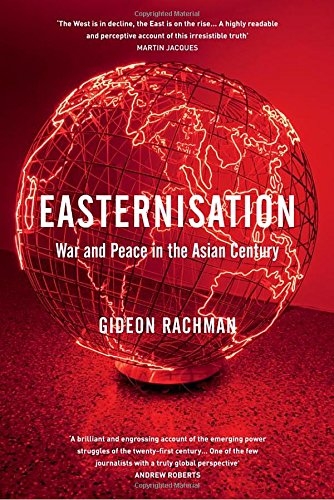The basic premise of Gideon Rachman’s journalistic long-view of the political relationship between Asia and the West is as follows: by 2025 two thirds of the world’s population will live in Asia; large populations power upswings in economic might (which in turn translates to military clout); there’s a distinct danger that should Asia, and specifically China, overtake the West, specifically America, in terms of its economic and military power (or rather when it does so), the world will fall into a so-called Thucydides trap, an estimation of the certainty of war when an established power is challenged by a rising one (in 12 out of 16 cases since 1500 this is deemed to have been the case).
‘The moment the United States lost its role as the underwriter of the global economic system’
The cogs have already been set in motion, warns Rachman (whose day job is the chief foreign affairs columnist at the Financial Times). In a book that is really more about China’s relationship with the West than Asia’s as a whole (the chapters on Japan and Korea, Southeast Asia and India in essence study those countries’ and regions’ relation to the West by way of China), Rachman notes that China is now the world’s largest economy in terms of purchasing power (according to the IMF; India and Japan take up the third and fourth positions behind the US); China is increasingly confident in the various territorial claims contested by its neighbours (which, given Washington’s pact of military support to both the Philippines and Japan, could ignite conflict in either the South China or East China Seas); and has made strategic moves to consolidate both its regional and global dominance (in the case of the latter, not least by establishing itself as the African continent’s largest trading partner and key investor).
To turn one’s attention to the other side, it hardly needs noting the belligerence with which the US will guard its superpower status (‘America has grown accustomed, psychologically and politically, to being the first among equals on the global stage,’ as Kurt Campbell, the former American assistant secretary of state for Asia immodestly puts it). Nonetheless, the 2015 formation of the Asia Infrastructure Investment Bank, a financial institution that aims to support the building of infrastructure in the Asia-Pacific region, initiated by and based in Beijing, to which the UK, Germany, South Korea and others signed up, risking the ire of Washington, was – Larry Summers, Obama’s former treasury secretary, bemoans – ‘the moment the United States lost its role as the underwriter of the global economic system’.
While this book’s title suggests there might be some discussion of a cultural pivot to the East, mirroring the economic and political one underway, Rachman’s perhaps paranoid warnings of war (one that will make the various Middle East conflicts look like a ‘sideshow’, he claims) leave little room for such matters. Either way, he is surely accurate in his assessment that the wind is blowing in China’s favour and the era of America’s post-Second World War dominance is coming to an end. The soft power of popular culture and the arts, which goes hand in hand with money and military might, could, if Rachman’s analysis proves correct, usher in a wholesale realignment not just of the world, but also of how we think about the world. In the Autumn 2015 issue of ArtReview Asia the theorist Sun Ge refers to the ‘fūdo’ character of Asia, the ‘particular natural geographical space that bears the weight of political, historical and spiritual culture’. As Asia’s power spreads, will its fūdo follow?
This article originally appeared in the Autumn 2016 issue of ArtReview Asia
